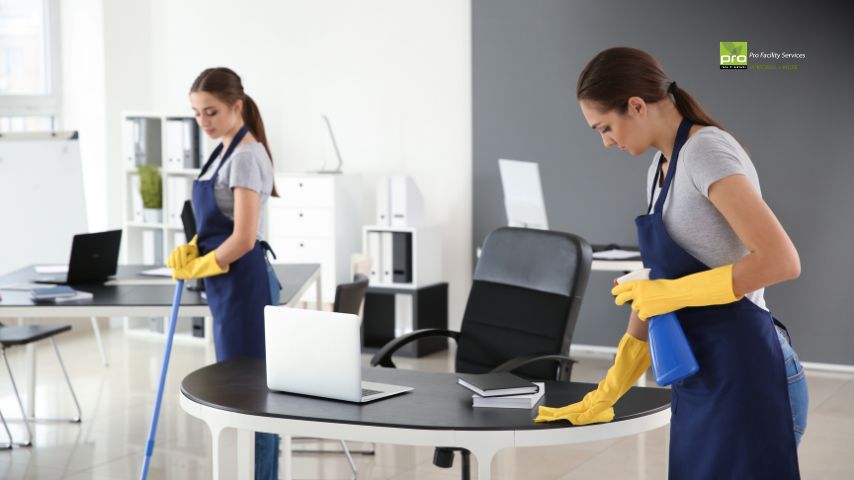In the fast-paced world of business and daily life, maintaining a clean and hygienic environment is essential for productivity, health, and overall well-being. This is where janitorial cleaning services come into play. Whether in office spaces, schools, healthcare facilities, or commercial establishments, janitorial cleaning serves as the backbone of cleanliness and sanitation. In this blog, we’ll explore what janitorial cleaning entails and why it holds such importance in our lives.
Table of Contents
ToggleWhat is Janitorial Cleaning?
Janitorial cleaning involves the regular cleaning and upkeep of commercial, industrial, or residential spaces to maintain cleanliness, hygiene, and organization. These services are provided by trained professionals working for janitorial companies or as part of in-house cleaning teams. The tasks are tailored to suit the specific needs of the space, ensuring an environment that is both clean and welcoming.
Unlike deep cleaning or specialized cleaning services, which focus on intensive, one-time tasks, janitorial cleaning emphasizes routine maintenance. Common responsibilities include dusting, vacuuming, mopping, trash removal, restroom sanitation, and surface disinfection. The goal is to maintain a consistent standard of cleanliness, preventing dirt and clutter from accumulating over time.
Janitorial cleaning is crucial for businesses and other facilities as it contributes to a healthier and more productive environment. Clean spaces reduce the spread of germs, enhance employee satisfaction, and leave a positive impression on clients or visitors. Whether in offices, schools, healthcare facilities, or retail spaces, janitorial cleaning ensures that day-to-day operations run smoothly within a well-maintained environment.
Common Tasks in Janitorial Cleaning
Janitorial cleaning encompasses a wide range of tasks, ensuring cleanliness, hygiene, and functionality in commercial spaces.
- Dusting and Surface Cleaning:
This involves removing accumulated dust and dirt from furniture, shelves, electronics, and other surfaces to maintain a clean and allergen-free environment. Regular surface cleaning enhances the overall appearance and longevity of items. - Floor Care:
Tasks include sweeping, mopping, vacuuming, and, when required, waxing or buffing floors to maintain their shine and durability. Proper floor care minimizes slip hazards and keeps high-traffic areas presentable. - Trash Removal:
Janitors ensure waste bins are emptied regularly and garbage is disposed of in an eco-friendly manner. This prevents unpleasant odours and contributes to sustainable waste management practices. - Restroom Maintenance:
Restrooms are cleaned and sanitized thoroughly, including sinks, toilets, urinals, and mirrors. Supplies like soap, paper towels, and toilet paper are replenished to ensure usability and hygiene. - Kitchen and Breakroom Cleaning:
Counters, sinks, microwaves, and coffee machines are sanitized to eliminate germs and maintain a clean food preparation area. Regular cleaning prevents the buildup of stains and odours. - Window Cleaning:
Interior and, occasionally, exterior windows are wiped down to remove smudges and dirt, leaving them crystal-clear. Clean windows enhance natural light and improve the overall ambience of spaces. - Restocking Supplies:
Essential cleaning products and hygiene supplies such as paper towels, toilet paper, and sanitisers are regularly replenished. This ensures uninterrupted operations and user satisfaction. - Minor Maintenance Tasks:
Janitors handle small repairs like replacing light bulbs, unclogging drains, or fixing loose handles. These tasks help maintain functionality and prevent larger maintenance issues.
Why is Janitorial Cleaning Important?
Janitorial cleaning is far more than just an aesthetic necessity. It plays a critical role in creating healthy, efficient, and welcoming environments. Below, we’ll delve into the key reasons janitorial cleaning is indispensable.
1. Promotes Health and Hygiene
Clean spaces are healthier spaces. Regular janitorial cleaning helps eliminate dirt, dust, allergens, bacteria, and viruses. This is particularly vital in high-traffic areas such as offices, schools, and healthcare facilities, where the spread of germs can lead to illness outbreaks.
For example:
- Reduced Risk of Illness: By disinfecting surfaces and high-touch areas, janitorial cleaning helps minimize the spread of contagious diseases like colds, flu, and COVID-19.
- Improved Air Quality: Dust and allergens can accumulate over time, leading to respiratory issues or allergies. Regular vacuuming, dusting, and air filter cleaning significantly improve indoor air quality.
2. Enhances Productivity
A clean and organized environment boosts employee morale and productivity. Clutter and mess can cause distractions, while a clean workspace fosters focus and efficiency. Employees working in a well-maintained environment are also less likely to take sick days, ensuring consistent workflow.
3. Creates a Positive Impression
First impressions matter. Whether it’s clients visiting your office or parents touring a school, the cleanliness of a facility speaks volumes about its management and values. Dirty or unkempt spaces can deter customers, students, or potential business partners.
- For Businesses: A clean office reflects professionalism, attention to detail, and a commitment to quality.
- For Public Spaces: Well-maintained public facilities contribute to a community’s reputation and visitor satisfaction.
4. Ensures Compliance with Health and Safety Regulations
Many industries are subject to stringent health and safety regulations, especially in sectors like food service, healthcare, and manufacturing. Janitorial cleaning ensures that facilities meet these standards, avoiding fines, penalties, or legal issues.
Examples of compliance benefits:
- Healthcare Facilities: Regular cleaning reduces the risk of healthcare-associated infections (HAIs).
- Restaurants: Clean kitchens and dining areas ensure adherence to food safety guidelines.
5. Extends the Lifespan of Assets
Regular cleaning and maintenance can prolong the life of furniture, carpets, flooring, and equipment. Dirt and grime can cause wear and tear over time, but consistent janitorial care helps preserve these assets, saving money in the long run.
6. Supports Sustainability Efforts
Many modern janitorial cleaning services incorporate eco-friendly practices, such as using green cleaning products, recycling waste, and minimizing water usage. This aligns with corporate social responsibility (CSR) goals and reduces the environmental footprint of a business or organization.
Types of Facilities That Benefit from Janitorial Cleaning
1. Offices: Janitorial cleaning in offices helps maintain a productive and professional atmosphere by ensuring clean desks, floors, and common areas. A tidy workspace not only boosts employee morale but also leaves a positive impression on clients and visitors, fostering a sense of trust and reliability.
2. Schools and Universities: Cleanliness in educational institutions is crucial for promoting a safe and healthy learning environment. Regular janitorial services help to prevent the spread of germs and allergens, ensuring that students and staff remain in a safe, hygienic space conducive to learning.
3. Healthcare Facilities: In healthcare settings, janitorial cleaning is essential for maintaining stringent hygiene standards. It protects both patients and healthcare workers from cross-contamination, ensuring that high-touch areas like patient rooms, waiting areas, and medical facilities are sanitized regularly to prevent infections.
4. Retail Stores: Janitorial services in retail environments enhance the shopping experience by keeping the store clean and organized. A spotless store reflects well on the brand, attracts customers, and creates a comfortable environment that encourages longer visits and repeat business.
5. Industrial Facilities: Janitorial cleaning in industrial facilities like warehouses, factories, and plants helps maintain safety and organization. Clean floors, equipment, and storage areas reduce the risk of accidents, improve productivity, and extend the lifespan of machinery and infrastructure.
6. Hospitality Venues: For hotels, resorts, and other hospitality venues, janitorial cleaning ensures that rooms and common areas are immaculate. This not only enhances guest satisfaction but also helps maintain the venue’s reputation, fostering positive reviews and repeat customers.
Key Components of a Professional Janitorial Cleaning Service
1. Customized Cleaning Plans
Professional janitorial companies tailor their services to meet the unique needs of each client. This includes determining cleaning schedules, selecting appropriate cleaning products, and focusing on specific areas of concern.
2. Skilled and Trained Staff
Janitorial cleaning staff are trained in using cleaning equipment, handling chemicals safely, and following best practices to achieve optimal results.
3. Use of Advanced Equipment
Modern janitorial services utilize advanced equipment such as HEPA filter vacuums, automated floor scrubbers, and electrostatic sprayers for disinfecting large areas quickly and efficiently.
4. Green Cleaning Practices
Many companies now offer eco-friendly options, using non-toxic cleaning agents and sustainable practices to reduce environmental impact.
Conclusion
Janitorial cleaning is a cornerstone of maintaining clean, safe, and productive environments. Its importance extends beyond aesthetics, encompassing health, safety, and sustainability. From ensuring compliance with regulations to fostering positive impressions, janitorial services play a vital role in various industries and settings.
Investing in professional janitorial cleaning services is not just about keeping spaces spotless—it’s about creating environments where people can thrive. Whether you’re running a business, managing a school, or operating a healthcare facility, prioritizing cleanliness through regular janitorial services can lead to long-term benefits for everyone involved.
FAQs
Q1. How often should janitorial cleaning be done?
Ans: The frequency of janitorial cleaning depends on the type of facility and its usage. Typically, daily or weekly cleaning is recommended for high-traffic areas, while others may require bi-weekly or monthly cleaning.
Q2. What tasks are included in janitorial cleaning?
Ans: Common tasks include dusting surfaces, vacuuming, mopping floors, trash disposal, restroom sanitation, window cleaning, and restocking supplies like toilet paper and hand soap.
Q3. Why is janitorial cleaning important for businesses?
Ans: It promotes health, enhances productivity, and makes a positive impression on clients. Clean spaces improve employee morale and reduce the spread of germs, contributing to a healthier workplace.
Q4. Is janitorial cleaning the same as deep cleaning?
Ans: No, janitorial cleaning focuses on routine maintenance, while deep cleaning involves more intensive, one-time tasks like carpet shampooing or thorough disinfection of all surfaces.



